
Understanding the Investigation into Minnesota's Transgender Athlete Policy
The Federal Civil Rights Office has opened an investigation into the state of Minnesota, focusing on allegations surrounding discrimination related to transgender athletes in school sports. This inquiry particularly stems from concerns over a transgender female softball player, which raises broader questions about inclusivity and equality in competitive sports. With an increasing number of states enacting policies that restrict the participation of transgender individuals in sports, Minnesota's case has become a spotlight in a national debate.
Why This Investigation Matters to LGBTQ+ Rights
The outcome of this investigation could set significant precedents for LGBTQ+ rights in sports across the nation. Advocates argue that allowing transgender individuals to compete according to their gender identity is crucial for their mental health and personal development. The Human Rights Campaign has stated that sport should reflect the values of respect, fairness, and inclusion, emphasizing that restrictions against transgender athletes can have detrimental effects on their mental well-being and self-identity.
Local Reactions and Community Impact
Locally, responses have varied. Supporters for transgender rights argue that this investigation should catalyze a stronger embrace of inclusivity within sports programs, promoting a safe space where all athletes can compete. Conversely, some community members express concerns regarding perceived fairness, questioning whether it is just for transgender females to compete against cisgender females. This regional dialogue reflects larger societal dynamics surrounding gender, identity, and rights.
Parallel Examples of Similar Investigations
Interestingly, Minnesota is not alone in facing scrutiny regarding transgender athletes in sports. Several other states, such as Idaho and South Dakota, have previously been involved in similar investigations or legislation aimed at regulating transgender athlete participation. These cases highlight the ongoing tension between emerging inclusive policies and traditional views of gender in sports, showcasing how the conversation over inclusion continues to evolve.
Future Implications for Sports Policies
As this investigation unfolds, its implications could spawn greater legislative efforts either supporting or opposing inclusive policies for transgender athletes. This could lead to more comprehensive frameworks that address the unique needs of transgender athletes, ensuring that they can participate fully while maintaining competitive integrity. Athletes and organizations will need to be ready to adapt to evolving standards that balance inclusivity with competitive fairness.
Inspiration from Athletes Who Champion Change
Some athletes have taken the fight for inclusivity into their own hands, becoming vocal advocates for their communities. Their stories serve as motivation for others to stand up and advocate for change. For example, figures like Chris Mosier, the first transgender athlete to qualify for the Olympics, continue to break boundaries, inspiring younger generations to embrace their identities and strive for their dreams in the sporting realm.
How Can You Get Involved?
To understand these complex issues fully, it's essential to follow not only the legal outcomes but also the personal narratives of athletes affected by these policies. Engaging with local advocacy groups, attending meetings, or simply being informed can help individuals contribute positively to this evolving conversation on gender and sports. Staying informed allows you to support policies that foster inclusivity as well as respect in sports.
As this situation develops, keeping a pulse on the changes and their impact on different communities is important. We encourage readers to share their thoughts, engage with local advocacy initiatives, and consider how they can support inclusivity within sports at all levels.
 Add Row
Add Row  Add
Add 




Write A Comment